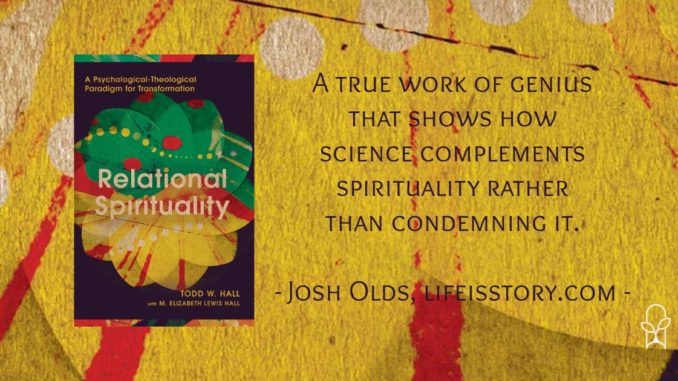
Series: Christian Association for Psychological Studies Books
Published by IVP Academic on May 25, 2021
Genres: Academic, Non-Fiction, Christian Life
Buy on Amazon
Goodreads

As our society becomes more socially fragmented, many Christians feel disconnected and struggle to grow spiritually. Common models of spiritual transformation are proving inadequate to address "the sanctification gap." In recent decades, however, a new paradigm of human and spiritual development has been emerging from multiple fields. It's supported by a critical mass of evidence, all pointing to what psychologists Todd W. Hall and M. Elizabeth Lewis Hall call a relational revolution. In Relational Spirituality, Hall and Hall present a definitive model of spiritual transformation based on a relational paradigm. At its heart is the truth that human beings are fundamentally relational--we develop, heal, and grow through relationships. While many sanctification models are fragmented, individualistic, and lack a clear process for change, the relational paradigm paints a coherent picture of both process and goal, supported by both ancient wisdom and cutting-edge research. Integrating insights from psychology and theology, this book lays out the basis for relational spiritual transformation and how it works practically in the context of relationships and community. Relational Spirituality draws together themes such as trinitarian theology, historical and biblical perspectives on the imago Dei, relational knowledge, attachment patterns, and interpersonal neurobiology into a broad synthesis that will stimulate further dialogue across a variety of fields. Highlighting key characteristics of spiritual communities that foster transformation, Hall and Hall equip spiritual leaders and practitioners to more effectively facilitate spiritual growth for themselves and those they serve.
This is one of those books you have to take your time working through. Relational Spirituality: A Psychological-Theological Paradigm for Transformation is an intimidating title, but at the heart of its message is simply that spiritual transformation happens through relationships. It brings together neurobiology, sociology, psychology, and theology in a cohesive and comprehensive overview of how people grow spiritually.
The first part of the book develops the need for a relational spirituality paradigm. The authors—Todd and M. Elizabeth Hall, both professors at Rosemead School of Psychology at Biola—contrast Western society’s increasing individualism and social fragmentation with the assertion that human beings are fundamentally relational. From this basis, they explore the disconnect between theology and spiritually, which left individuals with their doctrine disconnected from their spiritual experiences.
The second part develops the relational nature of spiritual transformation, beginning with a discussion of God as Trinity. If God is a trinity, he is therefore intrinsically relational. Humans, made in God’s image, are also relational. This is seen in evidence from infant research, attachment theory, neuroscience, and other areas of study. The work then takes a broader study of relationships, attachment, and how common attachment patterns manifest in our relationship with God.
Part three shifts focus to spiritual transformation. So, we’ve gone from the need for relations to how those relationships manifest and now to what those relationships are supposed to do, positioning the church as the place of spiritual transformation and growth. Stripped down to its bare-bones essentials, Relational Spirituality isn’t putting out a difficult concept: People grow spiritually when surrounded and supported by those in whom God’s Spirit mutually dwells. What the Halls do so well is provide support for this in the sciences, showing how multiple scientific disciplines support our need for relationship, particularly for spiritual growth.
Relational Spirituality is, in one sense, one of those books that uses a lot of words to say what could be said in just a few and appears to complicate an issue that many Christians might feel is pretty simple. But in a greater sense, what it does is show how foundational that “simple” issue is and how it permeates our very being. It’s a corrective to the superficial community that our churches often offer and the individualism and rationalism that pervade the Western church. It manages to provide us something more mystical and communal while being firmly grounded in contemporary scientific research. It’s a true work of genius that shows how science complements spirituality rather than condemning it.
